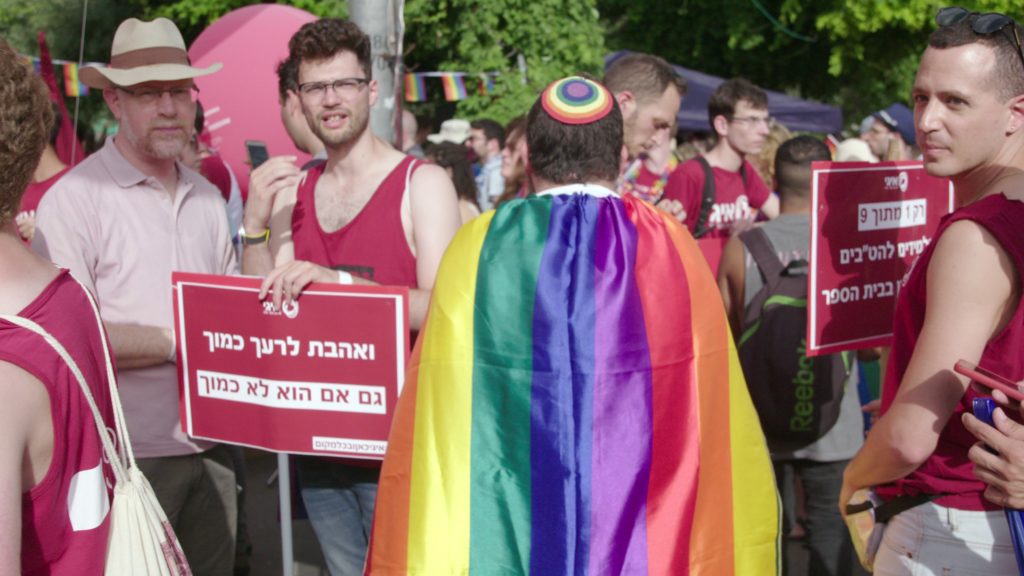
Though this year is technically the 25th anniversary edition of the Israeli Film Festival of Philadelphia, this spring’s version will take a different tack.
Rather than spoil the chance to celebrate a quarter-century of bringing Israeli film to Philadelphia, festival organizers are treating this edition as a one-off. They hope to have a proper celebration of 25 years in March 2022.
On top of that, admission to this year’s festival, which will screen online, will be free.
“We decided that, given the miserable state of people’s lives, because of COVID, we wanted to kind of pay it forward, for lack of a better word,” IFF founder and Artistic Director Mindy Chriqui said.
It wasn’t an easy decision, but it appears to have paid dividends. Requests for tickets have been high enough that “if we had to actually accommodate everybody in the theater, we probably would not have been able to,” she said.
Though it’s not the version of the festival that Chriqui her team would like to be putting on, this year’s slate of films reflects an enduring commitment to the core mission.
“We cannot do the festival, but we are committed to bringing to our audience and our supporters the latest and the newest Israeli releases,” said Hava Grunwald, the festival coordinator.
The 2020 edition of the festival was cut short, just one weekend into its March run. Chriqui and the IFF agonized over the movies that their audiences would never get to see; finally, last fall, they were able to send out links for online viewing.
It was good practice for this spring. The organizers have opted for a “theater” model, whereby viewers watch movies at the same time as others, rather than at their convenience.
“We wanted them to feel part of this whole festival,” Chriqui said.
The festival began on Feb. 25 and continues for eight weeks. The IFF sends emails each Thursday at noon with links to contemporary Israeli films. Interested viewers should visit iffphila.com and sign up for emails under “Join” to receive links to each movie.
Several movies will feature options to sign up for Zoom discussions with the creators and subjects (six out of the eight movies are documentaries). However, that schedule hasn’t been finalized.
Here is just a taste of the festival’s programming.
‘A Lullaby for the Valley,’ directed by Ben Shani, April 1
At the beginning of the documentary “A Lullaby for the Valley,” the painter Eli Shamir seems perfectly suited to his primary subject, the Jezreel Valley: He’s unceasingly warm, slyly magnetic and generally amused at the prospect of his own existence. It’s as if he’s saying, with an air of disbelief, “I, Eli Shamir, son of a farmer, have my paintings sold at unthinkable rates to dealers the world over? What can you do but laugh at such fortune?”
It’s a good thing he starts out that way, because Shamir, in his late 50s when filming began in 2011, was diagnosed with Parkinson’s disease in 2014. Over the next several years, as director Ben Shani chronicles, Shamir confronts his declining physical abilities each day. For someone who describes his work as an attempt to “capture the world” with the movement of his wrist, it begs the question: What if he can’t move his wrist the right way?
Shani followed Shamir the artist and Shamir the man, bridging any distance between the two. Shani has an eye for Shamir’s tiny dignities, from the respect he gives to his models to his desire to paint approachable, idyllic scenes. When Shamir’s physical decline worsens, Shani is with him in hospital scenes that are darkly funny.
Shani declares his admiration for Shamir’s work in one of the movie’s first scenes, but it would be apparent even if he didn’t say it. The shots of life on Shamir’s farm seem to be cinematic companions to Shamir’s art; the painter is lucky to have someone convey the way he sees the world with such fidelity.
The official premiere of this film is in April; this screening represents a sneak preview.
‘Marry Me However,’ directed by Mordechai Vardi, March 18
Rabbi Mordechai Vardi’s film about the lives of LGBT Israelis who entered heterosexual marriages for religious reasons is a tale of both confusion and clarity. The problem for many of the documentary’s subjects is that there are legions of people around them who seek to muddle what is clear and simplify what cannot be.
For those who stay with a partner they’re not attracted to or who decide on divorce, there are few they can approach for advice. Conversely, when it comes to sexual attraction — the one subject they’re certain about — there are more than enough conversion “therapists” hawking dubious medical and moral claims.
Some of the film’s subjects are supported by their families, but many are not. The opening scene of a gay man’s wedding to his wife — in which the melancholy of the groom contrasts with the merriment of the revelers — plays like a man being led to his execution.
What the subjects of “Marry Me However” are often left with, then, is each other, and the growing ranks of psychologists and rabbis who try to facilitate their acceptance in Israeli society. Vardi’s movie doesn’t have to work hard to make the case that it will be a long road. But the instances of reconciliation we see make it clear that it will be worth it.
[email protected]; 215-832-0740



